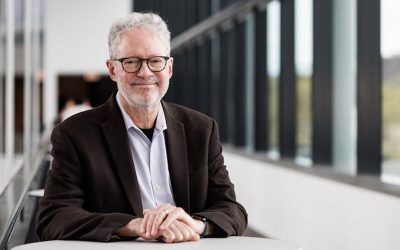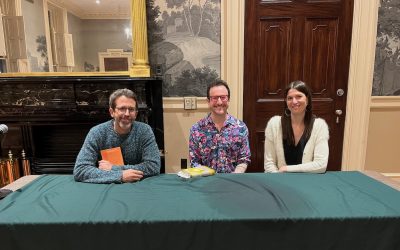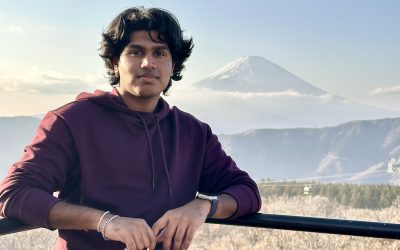A Drew degree changed the course of his career
February 2023 – The location of Drew Theological School’s Associate Teaching Professor in the History of Christianity and Methodist Studies Kevin Newburg’s original home is difficult for him to pinpoint. Growing up near Chicago, he has lived in San Diego, Kansas City, and Washington state.
Eighteen years ago, Newburg applied to the Theological School on a whim and found himself enrolling in Drew’s Doctor of Philosophy in Wesleyan and Methodist Studies. He has been in Madison, NJ, ever since. “We had no expectations to stay, it just wasn’t on the radar,” said Newburg.
During these 18 years, Newburg has been a student, teaching assistant, research archivist, interim Methodist librarian, and professor.
As a PhD student, Newburg was able to tailor his program to focus on Liturgical Studies and Wesleyan and Methodist Studies. “My coursework overlapped those two areas,” he said. “They didn’t have exactly what I wanted, but I was able to fashion that. It ended up being a much more pleasant experience for a variety of reasons than other institutions.”
An elder in The United Methodist Church, Newburg has over 30 years of pastoral experience. He also serves as pastor at the Livingston United Methodist Church in Livingston, NJ.
Read on to learn more about Newburg’s journey from student to professor. To us, it looks like he has found his home at Drew.
How do ministry and teaching inform each other?
My students think I preach to them and my congregants think I’m teaching them. They inform each other—always.
In class, we talk a lot about ministry and the realities of ministry. There’s very little that we do that is solely of a theoretical nature. During my history courses, we’re making connections to what is going on in local congregations or in denominations. In my Methodist courses, we talk about Methodism as a context and the differences in different churches and regions.
We have these very rich conversations about how our diverse student body practice and preach globally. The conversations are based on the theoretical, but it becomes very pragmatic.
Tell us about your work in Drew’s Methodist Library and the General Commission on Archives and History.
The only way to rummage around in the Methodist Library or the Archives is to work there—so I did while I was doing my coursework. One of my first tasks was processing all of the periodicals that came in from all over the world. It was very enriching to see what Methodists were doing across the globe.
I learned the holdings and how they can be used. I got a broader perspective on the materials, which broadened my own interests. You’re pulling resources for patrons coming from literally all over the world with their research, which is not narrow by any means. It’s very broad and global.
I try in all of my courses, as much as I can, to introduce my students to those resources and have them understand that Drew has the best holdings of Methodist material anywhere in the world.
Why is it important to integrate pastoral training with theological studies?
When I came to Drew, I was a pastor/scholar, but I don’t think I necessarily knew that or referred to myself that way.
When visiting my pastoral colleagues, we talked about church history, theology, the Bible, and had robust conversations. But when it came to what they did week-to-week in their congregations, they weren’t able to integrate those disciplines. They were not able to apply their theological studies to the very practical, pragmatic kinds of things.
My goal was to become educationally qualified to teach future ministers and model for them how you can integrate the standard disciplines and do that in ways that apply to the week-to-week activities in the church, as well as the more unusual activities in the church, such as baptism, marriage, or funerals.
The primary reason to integrate in a pragmatic way is to help people understand what they believe.
We ended up rewriting and reformulating the curriculum for the Theological School that embraced an integrative model. It’s been very fulfilling and exciting to be a part of that.
How does Drew’s diverse student population enrich your classroom?
The diversity of our students, as well as our faculty and staff, has always been exciting to me. The richness of the conversations, the way that my biases have regularly been challenged by the reality of who these folks are and what they teach me about their own context. I think any other place would be boring after experiencing this smorgasbord of students.
I know I will always learn something about another place in the world, which will help me to think more deeply and clearly about the way we do things and about the things we claim we think are important.
We tend to see the world and justice issues from our own perspective. In my opinion now, they tend to be too narrow. Some of the issues the rest of the world face are just as critical, if not more so. If we are going to be a global community and a global church, then we need to broaden our horizons.
Every time I teach a class, I know I will be working with a really amazing, broad, talented, capable, highly experienced, and deeply dedicated group of people.



